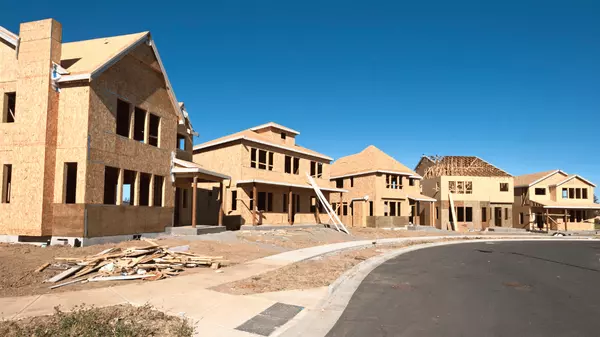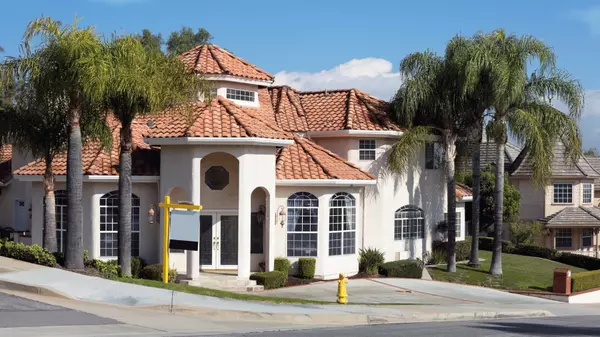7 Unmistakable Signs It's Time to Upgrade to a Larger Home

7 Unmistakable Signs It's Time to Upgrade to a Larger Home Every homeowner's journey is unique, but there comes a time when you feel the need for more space. In this article, we'll explore the 7 unmistakable signs that it's time to move up and upgrade to a larger home. If you recognize any of these signs in your life, it may be time to start looking for that perfect, spacious new home in the Conejo Valley. Keep reading to learn the factors that should be considered when determining whether it's time to upgrade and how to evaluate your needs based on your unique situation. 1. Outgrown Your Current Space Stat: According to a study by the National Association of Home Builders, over 50% of homeowners cited the need for more space as the main reason for moving. The most obvious sign it's time to upgrade is when your family has simply outgrown your current home. If your once spacious living room feels cramped, bedrooms are bursting at the seams, or you're constantly searching for extra storage space, it's time to consider an upgrade. Upgrading to a larger home can provide the additional square footage needed to accommodate your belongings and create a more comfortable living environment for everyone. Take an honest assessment of your current living space and ask yourself if it still meets your family's needs or if it's time for a change. 2. Changing Family Dynamics Tip: Plan for future changes in your family's needs, such as accommodating aging parents or having additional children, when searching for a larger home. Families grow and change over time, and it's essential to have a home that meets everyone's needs. Whether you're expecting a new addition to the family, welcoming aging parents into your home, or adapting to children leaving the nest, a larger house may be necessary to accommodate everyone comfortably. Before deciding on a new home, consider the long-term needs of your family and how a larger space can benefit everyone involved. Remember, upgrading to a more spacious home is an investment in your family's happiness and well-being. 3. Remote Work Demands Mistake to Avoid: Don't underestimate the importance of a dedicated workspace when considering a home upgrade, as it can greatly impact productivity and work-life balance. Remote work has become the norm for many professionals, and a dedicated home office has become more essential than ever. If you find yourself needing a quiet, separate space for work, upgrading to a larger home with extra rooms can boost your productivity and work-life balance. Think about your future career plans and whether a dedicated workspace is a necessity. Additionally, consider the potential for other family members to work or study from home, and how extra space can enhance everyone's daily routines. 4. Increased Home Value Stat: According to Zillow, the average U.S. home value increased by more than 17% in 2021 alone. If your current home has significantly increased in value, it might be the perfect time to sell and move up to a larger property. Use the equity you've built in your current home to invest in a more spacious and luxurious living space. Upgrading to a bigger home not only enhances your day-to-day comfort but can also be a savvy financial decision. Consult with a knowledgeable real estate agent to discuss the potential return on investment and how to leverage your home's equity in the most advantageous way. 5. Desire for a Different Location Actionable Tip: Research and visit different neighborhoods to find the one that best matches your family's lifestyle and preferences when considering a move. Your ideal neighborhood may have changed since you first bought your home. If you're craving a change of scenery, better schools for your children, or want to be closer to specific amenities like shopping centers, parks, or the beach, upgrading to a larger home in a more desirable location could be the perfect solution. Research different neighborhoods, and consider how a new location can improve your family's lifestyle and access to desired amenities. A strategic move can bring you closer to your dream home and neighborhood. 6. Improved Financial Situation Mistake to Avoid: Don't rush into upgrading your home without carefully evaluating your finances and consulting with a financial planner to ensure it's the right decision. If your financial situation has improved since you bought your current home, you may be in a position to afford a larger, more comfortable space. Take a close look at your finances, considering your current income, job stability, and future financial goals, to determine if moving up is a feasible and responsible decision. Consult with a financial planner or mortgage expert to understand your borrowing capacity and the best mortgage options available for your situation. Remember, upgrading to a more spacious home is not only about improving your quality of life but also making a sound financial decision that aligns with your long-term goals. 7. Long-term Investment Opportunities Stat: According to the Federal Housing Finance Agency, U.S. home prices have increased at an average annual rate of 3.9% since 1991. A larger home can be a great long-term investment, particularly in desirable areas like the Conejo Valley and Malibu. By moving up to a larger property, you're building wealth and creating a valuable asset for the future. Additionally, investing in a larger home can provide opportunities for rental income if you decide to rent out extra rooms or even the entire property. Research the local real estate market trends, and consult with a trusted real estate agent to identify prime locations and properties with strong growth potential. Conclusion In conclusion, upgrading to a larger home is a significant decision that requires careful thought and planning. If you've identified any of these 7 signs in your life, it might be time to move up and embrace a more spacious, comfortable living environment. As your trusted real estate team in the Conejo Valley, we're here to help you find the perfect home that meets your growing needs. Get in touch with us below to start your journey towards a spacious and luxurious new home. Remember, your home should be a sanctuary that supports your lifestyle and the needs of your family – and sometimes, that means making the exciting leap to a larger space.
Read MoreUnlocking the Secrets of Simi Valley Real Estate: A Guide to Home Types

Unlocking the Secrets of Simi Valley Real Estate: A Guide to Home Types Simi Valley is a treasure trove of diverse and desirable homes, catering to every taste and budget. In this comprehensive guide, we'll delve into the various types of homes for sale in this picturesque city, offering insights into each property style and helping you find the perfect fit for your lifestyle. 1. Single-Family Homes: A Suburban Dream Single-family homes dominate the Simi Valley real estate landscape. They offer spacious living areas and private yards for families to enjoy. These properties vary in size, design, and price, ensuring that there's something for everyone. From first-time buyers to seasoned homeowners seeking an upgrade, Simi Valley has it all. Tip: Consider neighborhoods like Texas Tract or White Oak Creek for affordable single-family homes with excellent amenities. 2. Condos and Townhomes: Low-Maintenance Living For those seeking a low-maintenance lifestyle, condos and townhomes in Simi Valley provide the perfect solution. These properties offer shared amenities, like swimming pools and fitness centers. In addition, exterior maintenance and landscaping services are typically covered too. This allows residents to enjoy the perks of homeownership without the added workload. Actionable Tip: Explore communities like Sycamore Villas and Park Lane, which offer a variety of condos and townhomes to suit different budgets and preferences. 3. Luxury Estates: Indulge in the Finer Things Simi Valley is home to several prestigious neighborhoods. Here you'll find where luxury estates offer the ultimate in opulence and sophistication. With sprawling floor plans, high-end finishes, and breathtaking views, these properties cater to discerning buyers seeking the epitome of Southern California living. Mistake to Avoid: Don't limit your search to just one luxury neighborhood; each offers unique benefits and amenities that may appeal to different buyers. 4. Custom and New Construction Homes: Create Your Dream Home For those with a specific vision in mind, custom and new construction homes in Simi Valley provide the opportunity to design and build the perfect residence. These properties offer buyers the chance to select their preferred finishes, layouts, and features. This process ensures that the final product truly reflects their unique tastes and requirements. Stat: According to Zillow, new construction homes in Simi Valley have a median listing price of around $850,000. Conclusion With a diverse array of homes for sale, Simi Valley offers something for every homebuyer, from charming single-family homes and low-maintenance condos to luxurious estates and customizable new builds. Embark on your Simi Valley home search with confidence, knowing that the perfect property is waiting for you in this enchanting community. See the homes for sale in Simi Valley today to discover the ideal home that meets your needs and fulfills your dreams.
Read MoreDiscover the Magic of Simi Valley: Your Ultimate Real Estate Guide for Homes and Neighborhoods

Discover the Magic of Simi Valley: Your Ultimate Real Estate Guide for Homes and Neighborhoods Simi Valley is the perfect place to call home, blending suburban charm with incredible real estate opportunities. As a local real estate expert, I've witnessed firsthand the undeniable allure of this thriving community. In this article, we'll explore the types of homes and neighborhoods, things to do, and the location's unparalleled appeal, all from a real estate perspective. So, sit back and immerse yourself in the vibrant tapestry of Simi Valley, a place you'll soon want to call home. 1. A Diverse Range of Homes and Neighborhoods Simi Valley's housing market boasts a wide variety of options, catering to every taste and budget. From charming single-family homes in cozy neighborhoods to luxurious estates tucked away, there's something for everyone in this picturesque valley. First-time homebuyers will find neighborhoods with affordable options. Growing families and those seeking an upscale lifestyle can enjoy the many amenities these communities have to offer. With tree-lined streets, well-maintained parks, and a genuine sense of community, Simi Valley provides the perfect backdrop for your dream home. Tip: Explore neighborhoods like Wood Ranch, a master-planned community located on the west side of Simi Valley known for its natural beauty, excellent schools, and upscale housing. Try Indian Hills, a neighborhood located in the south-central part of Simi Valley with a mix of single-family homes and townhomes, great schools, and a park-like setting. 2. A Haven for Outdoor Enthusiasts With its stunning natural surroundings, Simi Valley provides countless opportunities for outdoor recreation. The city is surrounded by breathtaking parks and open spaces. Be sure to check out Simi Valley Dog Park, Corriganville Park, and the vast Santa Susana Pass State Historic Park. Enjoy hiking, biking, and horseback riding amidst the dramatic rock formations and rolling hills. Take a trip to the iconic Ronald Reagan Presidential Library and soak up the panoramic views. Wherever your journey takes you, Simi Valley's commitment to preserving its natural beauty remains the same. Residents' focus on promoting a healthy, active lifestyle is sure to captivate the hearts of nature lovers. Mistake to Avoid: Don't overlook the potential for increased property value in areas near popular outdoor attractions. 3. Exceptional Schools and Family-Friendly Atmosphere Simi Valley is home to top-rated schools and a tight-knit community, making it the perfect place to raise a family. The city's strong emphasis on education, safety, and community involvement attracts home buyers who value a nurturing environment. From elementary schools like Vista Elementary to prestigious high schools like Simi Valley High, students here receive an excellent education that prepares them for bright futures. Beyond academics, the city offers a wealth of family-friendly activities and events, including the Simi Valley Days Parade and Carnival, the Simi Valley Street Fair, and Movies in the Park. Stat: According to Niche, Simi Valley schools have an overall A- rating, with several schools earning an A+. 4. Ideal Location with Easy Access to Surrounding Areas Situated just 40 miles northwest of Los Angeles, Simi Valley offers easy access to both urban excitement and coastal relaxation. Commuters will appreciate the convenient proximity to major highways, such as the 118 and the 101, and public transportation options like Metrolink. From a spontaneous day trip to the beach in Malibu to an exhilarating night out in Downtown LA, you'll never run out of adventures. Simi Valley's strategic location combines the serenity of a suburban haven with the convenience of nearby metropolitan amenities, making it the best of both worlds. Actionable Tip: Look for homes near transportation hubs to ensure a smooth and stress-free commute. 5. A Thriving Local Economy and Job Market Simi Valley's strong job market and growing industries make it an attractive destination for both home buyers and sellers. Major employers in the area include the aerospace, healthcare, and technology sectors. The robust local economy continues to thrive. Companies such as AeroVironment, Adventist Health Simi Valley, and Meggitt PLC provide a stable job market and foster economic growth. With a diverse array of employment opportunities, residents can enjoy shorter commutes and a higher quality of life. The thriving economy also ensures a healthy real estate market, creating an ideal environment for both buyers and sellers. Stat: Simi Valley's unemployment rate is lower than the national average, at just 3.9%. Conclusion Simi Valley is a real estate paradise, offering a diverse range of homes, excellent schools, an array of recreational activities, a prime location, and a thriving economy. Whether you're looking to buy or sell a home in this charming community, there's no better time to dive into the Simi Valley real estate market. Discover the magic of Simi Valley and let the breathtaking landscapes, friendly neighborhoods, and vibrant local culture captivate you. Start your home search today and find the perfect place to plant your roots in this enchanting valley. When you're ready, our team here at TristanAndAssociates.net will guide you along the way.
Read MoreThe Essential 10: Questions Every Homebuyer Must Ask Real Estate Builders

The Essential 10: Questions Every Homebuyer Must Ask Real Estate Builders As a first-time homebuyer, knowing the right questions to ask can make all the difference when purchasing new construction. This article will dive deep into the top 10 questions that will empower you to make well-informed decisions and become a skilled negotiator. Let's explore these essential inquiries together, and by the end, you'll confidently navigate the new construction landscape. 1. What's included in the base price? Builders often use low base prices as a marketing tactic to draw in buyers. Keep in mind these prices usually don't cover all the features and upgrades you'll desire. Ask for a comprehensive list of what's included in the base price and the costs of popular upgrades. Tip: Obtain an itemized list to help you compare builders and make well-informed decisions about your new home. 2. What warranties do you provide? New construction homes generally come with an array of warranties. Request written documentation of all warranties—covering appliances, structural components, and workmanship. This will clarify your rights as a homeowner and safeguard your investment. Mistake to avoid: Never assume warranties are automatically included; always ask for written confirmation. 3. How customizable is the floor plan? Floor plan customization varies among builders. Inquire about the extent to which you can modify the layout, room sizes, and other design elements. This will ensure your new home truly aligns with your needs and preferences. Actionable tip: Bring a list of your desired modifications to discuss with the builder and get a clear understanding of what is possible. 4. What are the energy-efficient features of the home? Energy-efficient homes offer savings on utility bills and reduce environmental impact. Ask about energy-efficient features, such as insulation, windows, and appliances. This information can guide you toward a cost-effective and eco-conscious decision. Relevant stat: Energy Star says energy-efficient homes can save homeowners up to 30% on energy bills. 5. Can I speak with previous clients? Talking to previous clients can yield invaluable insights into the builder's work quality and customer service. Request contact information for at least three past clients. Their experiences and feedback can help you gauge your potential satisfaction with the builder. Actionable tip: Prepare a list of questions to ask the previous clients about their overall experience and any issues they encountered. 6. What is the timeline for construction and move-in? A clear construction timeline helps you plan your move and sidestep potential conflicts. Ask for a well-defined timeline, including milestones and possible delays. This information will help you coordinate your schedule and manage expectations. Mistake to avoid: Don't assume the builder's initial timeline is set in stone; always account for potential delays. 7. What is your process for addressing construction issues or changes? Even with meticulous planning, issues can emerge during construction. Inquire about the builder's process for handling change orders and resolving problems. This will instill confidence in their ability to respond effectively and maintain open communication. Actionable tip: Establish a communication plan with the builder to stay updated on progress and address concerns promptly. 8. Are there any homeowners' association (HOA) fees or rules? HOAs can impact your budget, lifestyle, and property rights. Ask about the fees, rules, and restrictions associated with the community. This information will help determine if the community meets your needs and expectations. Relevant stat: According to Investopedia, the average monthly HOA fee in the U.S. ranges from $200 to $300. 9. What incentives do you offer? Builders occasionally provide incentives to attract buyers, such as credits for closing costs or upgrades. Inquire about any incentives that may be available to you. These can help reduce your overall costs and make the home more affordable. Actionable tip: When negotiating with the builder, consider asking for incentives to be added to your contract, such as covering closing costs or offering appliance upgrades. 10. Can I have my own inspector review the home? Having an independent inspector review the home can offer peace of mind and uncover potential issues. Ask if you can bring in your own inspector and if the builder will address any issues they find. This will ensure the home meets your standards and expectations. Mistake to avoid: Don't rely solely on the builder's inspection; an independent inspector can provide an unbiased assessment of the property's condition. In conclusion, asking the right questions is crucial when considering new construction. By addressing these 10 essential topics with builders, you'll be well-equipped to make informed decisions and secure the perfect home for you and your family. As first-time new construction homebuyers, you deserve the best, so don't hesitate to reach out to our team at www.tristanandassociates.net for expert guidance on your homebuying journey.
Read MoreInheritance Simplified: A Comprehensive Guide to Handling Inherited Property

Inheritance Simplified: A Comprehensive Guide to Handling Inherited Property Inheriting a property can be both a blessing and a challenge. As an experienced real estate agent, I'm here to share expert advice to guide you through the process of managing inherited property, from understanding your options to making informed decisions. This comprehensive guide, combining feelings, fun, and facts, will help you navigate the complexities of inherited property ownership with confidence and ease. Let's embark on this journey together and unlock the potential of your newly-acquired asset. 1. Seek Legal and Tax Advice When inheriting a property, it's crucial to consult with legal and tax professionals. It's a great way for you to fully understand the implications of your inheritance. This may include probate procedures, tax liabilities, and potential legal disputes. Probate is the legal process of transferring property ownership to the rightful heirs. It can be time-consuming and may involve court proceedings. An attorney can help you navigate probate efficiently and ensure that the property is transferred correctly. Additionally, there may be estate taxes, inheritance taxes, or capital gains taxes associated with the property. A tax advisor can help you understand your tax obligations and develop a strategy to minimize your liability. Tip: Consult a trusted attorney and tax advisor to help you navigate the legal and financial aspects of inherited property ownership and avoid costly mistakes. 2. Assess the Property's Condition Before deciding the future of an inherited property, thoroughly assess its condition. This includes inspecting for structural issues, outdated systems, and potential repairs or improvements needed. A property in poor condition may require significant investment to bring it up to modern standards. A well-maintained property may only require minor updates to maximize its value. It's essential to have a clear understanding of the property's condition before making any decisions about its future. Actionable tip: Hire a professional home inspector to provide a detailed report on the property's condition, so you can make an informed decision about its future. This inspection should cover the structural integrity, electrical and plumbing systems, heating and cooling systems, and the overall maintenance status of the property. 3. Evaluate Your Options There are several options to consider when inheriting a property: moving in, renting it out, or selling it. Each option has its pros and cons, depending on your personal circumstances and financial goals. Moving in may be a good choice if the property is in a desirable location and suits your needs. Renting the property can generate passive income and help cover ongoing expenses, but it comes with the responsibilities of being a landlord. Selling the property allows you to cash in on its value and use the proceeds for other investments or financial goals. Mistake to avoid: Making a hasty decision without evaluating the long-term implications of each option. Take the time to weigh the advantages and drawbacks of each choice before making a final decision. Consider factors such as your current living situation, financial goals, and the local real estate market. 4. Understand the Financial Implications Inheriting a property can have significant financial implications, such as mortgage payments, property taxes, insurance, and maintenance costs. It's essential to understand these obligations and plan accordingly. If the property has a mortgage, you may need to refinance the loan or pay it off within a specified timeframe. Additionally, you'll need to budget for property taxes, insurance premiums, and routine maintenance expenses. Be prepared for unexpected costs, such as repairs or improvements, which can arise over time. Fact: Inheriting a property with a mortgage may require you to refinance the loan or pay it off within a specified timeframe. It's crucial to have a clear understanding of the property's financial obligations and develop a plan to manage these expenses. 5. Consult a Local Real Estate Agent When inheriting a property, it's vital to partner with a local real estate agent who can provide expert guidance and support. They can help you understand the local market, evaluate your options, and maximize the value of your inherited property. A knowledgeable real estate agent can offer insights into the neighborhood, local amenities, and comparable properties to help you make an informed decision. They can also assist in marketing the property if you choose to sell or rent it, ensuring you get the best possible return on your investment. Quote: "Working with an experienced real estate agent can be the key to unlocking your property's full potential." - Tristan and Associates Conclusion Inheriting a property can be an emotionally and financially challenging experience, but with the right guidance and resources, it can also be a valuable opportunity. By seeking legal and tax advice, assessing the property's condition, evaluating your options, understanding the financial implications, and consulting a local real estate agent, you'll be well-prepared to make the most of your inherited property. Trust the professionals at www.tristanandassociates.net to guide you through the complexities of inherited property ownership and help you unlock its full potential. Embrace the journey ahead and transform your inherited property into a valuable asset for your future.
Read MoreNeighborhood Navigator: Your Essential Guide to Moving to a New Neighborhood in the Conejo Valley

Neighborhood Navigator: Your Essential Guide to Moving to a New Neighborhood in the Conejo Valley Moving to a new neighborhood is a life-changing experience. As a local expert, I'm excited to share valuable tips for relocating to the picturesque Conejo Valley. This comprehensive guide will help you smoothly transition to your new surroundings and make the most of your fresh start. Embrace the opportunity to explore the Conejo Valley's vibrant communities and discover your dream neighborhood. Research Local Amenities and Services Before settling on a new neighborhood, it's crucial to research the local amenities and services available. The Conejo Valley offers a diverse array of communities, each with its unique characteristics and charm. Consider the proximity to schools, parks, shopping centers, and medical facilities, as well as recreational opportunities like hiking trails, golf courses, and community centers. Tip: Compile a list of your must-have amenities to help you identify the perfect neighborhood for your lifestyle. This personalized approach will ensure your new community aligns with your values and supports your desired way of life. Visit Neighborhoods at Different Times To get an accurate feel for a neighborhood, visit at various times of the day and week. This will give you insight into the area's vibe, traffic patterns, and noise levels. Pay attention to parking availability, pedestrian activity, and the overall atmosphere during these visits. Observe how the environment changes from morning to evening, weekdays to weekends, and consider how these fluctuations might impact your daily routine. Actionable tip: Schedule visits during weekday mornings, afternoons, and evenings, as well as weekends, to get a comprehensive understanding of the neighborhood's daily rhythms. This strategy will help you find a community that genuinely feels like home. Connect with Local Residents One of the best ways to learn about a neighborhood is by speaking with the people who live there. Local residents can provide valuable information about the community's strengths and weaknesses. They can inform you of the quality of local schools to the friendliness of neighbors. Be sure to attend neighborhood events as well. Engage with residents to gather firsthand insights by attending community meetings, farmer's markets, or local festivals. Mistake to avoid: Relying solely on online research and opinions can result in a limited perspective of the area. Engage with local residents to gain a more comprehensive understanding of the community's culture and lifestyle. Assess Safety and Crime Rates Your family's safety is paramount when moving to a new neighborhood. Review local crime statistics and speak with law enforcement officers to understand the safety of the area. Inquire about neighborhood watch programs or other community safety initiatives that may be in place. Don't hesitate to ask local residents for their perspectives on safety concerns and crime prevention efforts within the community. Fact: The Conejo Valley is known for its safe, family-friendly communities, making it an ideal place to call home. By prioritizing safety, you'll ensure a comfortable and secure environment for you and your loved ones. Work with an Experienced Local Real Estate Agent Partnering with a knowledgeable local real estate agent who is familiar with the Conejo Valley's neighborhoods will ensure you find the perfect fit for your family. A local expert can provide invaluable guidance and advice. They will help you navigate the area's housing market, identify hidden gems, and secure the best possible deal on your dream home. Quote: "A knowledgeable, caring agent is worth their weight in gold." - Barbara Corcoran Trust the professionals at www.tristanandassociates.net to support you throughout the relocation process. They'll offer personalized attention and unparalleled expertise in the Conejo Valley. Conclusion Moving to a new neighborhood in the Conejo Valley is an exciting adventure. It's filled with opportunities for personal growth and lasting memories. By researching local amenities and services, visiting neighborhoods at different times, connecting with local residents, assessing safety and crime rates, and working with an experienced local real estate agent, you'll be well-prepared to make a smooth transition to your new community. Trust the professionals at www.tristanandassociates.net to guide you through the process. We'll help you find the perfect neighborhood in the Conejo Valley. Embark on your neighborhood exploration today and uncover the hidden gems that await you in this beautiful region. With thoughtful planning and the right resources, you'll soon be enjoying the vibrant, welcoming community you've always envisioned as your home.
Read MoreCondo Conquest: The Ultimate First-Time Buyer's Guide to Purchasing a Condo Home

First-Time Condo Buyer's Guide: Expert Tips for a Successful Condo Home Purchase Buying a condo is a thrilling adventure. This article will provide you with essential tips and a guide to successfully purchasing a condo as your first home. We'll explore the nuances of condo living and help you embark on this exciting journey with confidence. Embrace the opportunity to own a beautiful space in a thriving community while making a sound investment in your future. Evaluate Condo Lifestyle Suitability Before diving into the world of condo ownership, it's crucial to evaluate if the condo lifestyle aligns with your personal preferences and needs. Condos offer a low-maintenance, community-focused living experience. This can be highly appealing to busy professionals, young families, and retirees alike. Tip: Consider your desired level of privacy, willingness to abide by community rules, and appreciation for shared amenities when assessing your compatibility with condo living. Condo living often involves shared walls and common areas. Be sure to consider if you're comfortable with close proximity to neighbors and sometimes noises. Additionally, weigh the benefits of having access to amenities like a pool, gym, or clubhouse against the potential limitations imposed by condo association rules. Research the Condo Association Understanding the condo association's financial health, bylaws, and management is vital to ensure you're making a sound investment. A well-managed association can significantly impact your living experience and property value. Mistake to avoid: Neglecting to research the condo association may result in unexpected fees, poorly maintained amenities, and potential conflicts with neighbors. Request copies of the association's financial statements, meeting minutes, and reserve study to gain insight into the community's stability and management practices. Also, familiarize yourself with the bylaws and any restrictions that may affect your lifestyle. These can be things such as pet policies, parking regulations, or rental restrictions. Obtain a Pre-Approval Letter Before you begin your search for the perfect condo, obtain a pre-approval letter from a mortgage lender. This provides a clear understanding of your budget and demonstrates to sellers that you're a serious buyer. Fact: In a competitive market, having a pre-approval letter can make the difference between securing your dream condo or losing it to another buyer. A pre-approval letter not only helps you focus your search on condos within your price range, but it also gives you an advantage when making an offer. Sellers are more likely to accept an offer from a buyer with a pre-approval letter. This will show financial preparedness and commitment to the purchase. Work with an Experienced Real Estate Agent Navigating the condo market can be a challenging task. This makes it essential to partner with a knowledgeable real estate agent who understands the unique aspects of condo transactions. An experienced agent can help you identify suitable properties, navigate complex association rules, and negotiate the best possible terms for your purchase. Quote: "The best investment on Earth is earth." - Louis Glickman Working with an experienced agent will help you find the ideal condo in the Conejo Valley while avoiding potential pitfalls. Your agent will be your advocate and guide throughout the entire process, ensuring a smooth and successful transaction. Assess Future Resale Potential When purchasing a condo, consider its future resale potential. Factors such as location, amenities, and association stability can impact your condo's value over time. Take time to evaluate the local real estate market trends and future development plans in the area. These can highly influence your property's appreciation. Proximity to public transportation, shopping centers, schools, and recreational facilities can also boost your condo's resale value. Actionable tip: Look for condos with desirable features and a strong community reputation to ensure a promising return on investment when it's time to sell. Additionally, consider the unit's layout, view, and floor level, as these factors can affect future buyer interest. By selecting a condo with strong resale potential, you're not only investing in a comfortable living space but also securing a valuable asset for the future. Conclusion Purchasing a condo as your first home can be a rewarding and fulfilling experience. With careful consideration of your lifestyle preferences, diligent research of the condo association, obtaining a pre-approval letter, partnering with an experienced real estate agent, and assessing future resale potential, you'll be well-prepared to conquer the condo market. Trust the expert team at www.tristanandassociates.net to guide you through the process and help you find the perfect condo in the Conejo Valley. Embark on your condo conquest today and discover the joys of condo living. With the right preparation and guidance, you'll soon be enjoying the benefits of homeownership in a vibrant, welcoming community.
Read MoreUnveiling the HOA Secrets: A Real Estate Agent's Guide to Homeowner Associations

Unveiling the HOA Secrets: A Real Estate Agent's Guide to Homeowner Associations Homeowner associations are a double-edged sword. That's my strong opinion as a seasoned real estate agent who has seen it all. In this article, I'll walk you through the pros and cons of homeowner associations (HOAs) to help you make an informed decision when buying your dream home. With a mix of feelings, fun, and facts, we'll explore the world of HOAs and their impact on your real estate journey. Understanding both the benefits and the drawbacks of HOAs can significantly influence your buying decision. This ensures you find the perfect home that meets your needs and expectations. Pro: Consistent Community Standards HOAs enforce community standards, ensuring a visually appealing and well-maintained neighborhood. This helps preserve property values and fosters a sense of pride among residents. By implementing rules and regulations, HOAs maintain the overall aesthetic and cleanliness of the community. This can lead it to be more desirable for potential buyers. Tip: Always review the HOA's guidelines before purchasing to ensure they align with your personal preferences. Familiarize yourself with the standards and decide whether they align with your vision of a perfect home. Adhering to these rules is crucial for a harmonious living experience. Con: Restrictive Rules HOAs can be restrictive, dictating everything from house colors to landscaping choices. These limitations may curb your creative freedom and personal expression. For some homeowners, these rules may feel stifling, hindering their ability to make the home truly their own. Mistake to avoid: Ignoring HOA rules can result in fines, so make sure you're comfortable with the restrictions before buying. Ensure that you read and understand the HOA's bylaws and restrictions before committing to a purchase. Non-compliance can lead to unpleasant consequences and a potential strain on your relationship with your neighbors. Pro: Access to Shared Amenities HOAs often provide access to shared amenities such as pools, clubhouses, and parks. This tends to enhance the quality of life for residents and promotes a sense of community. These amenities contribute to a more enjoyable living experience, offering opportunities for socialization and recreation right within your neighborhood. Fact: In a 2020 survey, 62% of respondents said they were satisfied with their community association experience, citing amenities as a top reason. When considering a property within an HOA, take the time to evaluate the available amenities and their potential value to your lifestyle. They can be a significant advantage of living in a well-managed community. Con: Monthly Fees and Special Assessments Homeowners must pay monthly fees to cover shared expenses. They may also face unexpected special assessments for major projects, which can strain your budget. HOA fees can vary widely and may increase over time, impacting your monthly expenses and potentially affecting your financial planning. Actionable tip: Factor HOA fees into your monthly budget and ask about the possibility of special assessments before purchasing a home. To avoid financial surprises, research the history of fee increases and special assessments within the community. Be prepared for potential fluctuations that may come in the future. Pro: Conflict Resolution and Dispute Management HOAs can provide a structured process for resolving disputes between neighbors, and maintaining a harmonious living environment. Issues such as noise complaints, property line disputes, or parking problems can be efficiently addressed through the HOA's established procedures. Quote: "A good neighbor increases the value of your property." - Czech Proverb By offering a neutral platform for conflict resolution, HOAs can help maintain positive relationships among residents and preserve the overall quality of life within the community. Conclusion The world of homeowner associations can be both rewarding and challenging. While HOAs provide numerous benefits such as consistent community standards, access to shared amenities, and conflict resolution, they can also impose restrictive rules and financial burdens. As you embark on your journey to find the perfect home in the Conejo Valley, be sure to weigh these pros and cons to make the best decision for your lifestyle. For personalized guidance and expert advice, trust the team at www.tristanandassociates.net. We are here to help you navigate the complexities of the real estate market, ensuring you find a home that aligns with your vision and brings you joy for years to come.
Read MoreThe Comprehensive Guide to Closing Your Dream Home: Master the Process as a First-Time Buyer

The Comprehensive Guide to Closing Your Dream Home: Master the Process as a First-Time Buyer Owning a home is a dream come true, but the closing process can be daunting for homebuyers. As a 20+ year real estate expert in the Conejo Valley and Malibu, I've guided numerous homebuyers through the complexities of closing. In this article, I'll provide a detailed overview of the closing process from the buyer's perspective. I'll break it down into five main steps to help you confidently navigate this exciting journey. 1. Pre-Closing Preparation Ensure a smooth closing by laying a solid foundation. Before closing, take care of the following crucial tasks: Secure financing: Obtain a mortgage pre-approval, finalize your loan, and lock in your interest rate. Stay in close communication with your lender to avoid delays. Schedule a home inspection: Hire a professional to inspect the property for any issues that need to be addressed before closing. Review the property's title: Work with a title company to ensure there are no liens, easements, or other title issues. Negotiate contingencies: With the help of your real estate agent, negotiate contingencies in the purchase contract, such as financing, appraisal, and inspection.Tip: Choose a reputable real estate agent who can guide you through these tasks and coordinate with the seller. 2. Preparing for Closing Day Stay organized and informed as the big day approaches. In the days leading up to closing, keep track of the following: Review the Closing Disclosure: This document outlines the final loan terms and closing costs. Compare it to the Loan Estimate provided by your lender and address any discrepancies. Conduct a final walk-through: Schedule a walk-through 24 hours before closing to ensure the property is in the agreed-upon condition and that any agreed-upon repairs have been completed. Prepare funds: Determine the exact amount needed for closing costs and obtain a cashier's check or set up a wire transfer. Mistake to Avoid: Don't make significant financial changes, such as opening new credit lines or making large purchases, which could affect your loan approval. 3. The Closing Day Sign on the dotted line and make your dream a reality. On closing day, you'll meet with your agent, lender, and a closing agent to review and sign documents related to: The property: This includes the deed and any property-related disclosures. The mortgage: You'll sign the promissory note, deed of trust, and other mortgage-related documents. The escrow: Review and sign the escrow settlement statement. In addition, you'll need to provide proof of homeowners insurance and pay closing costs, which typically range from 2-5% of the home's purchase price. Mistake to Avoid: Bring a valid photo ID and a cashier's check for your closing costs to avoid any last-minute complications. 4. Post-Closing: Final Steps Take care of essential tasks to make your new house a home. Once you've closed on your dream home, tackle these post-closing responsibilities: Record the deed: The closing agent will record the deed with the local government to finalize the transfer of ownership. Change the locks: For security, replace or rekey the locks on your new home. Set up utilities: Contact utility companies to set up electricity, gas, water, and other services. File a change of address: Update your address with the post office, financial institutions, and other relevant parties. Stat: According to the National Association of Realtors, 32% of recent homebuyers were first-time buyers. 5. Enjoying Your New Home Celebrate your achievement and create lasting memories. Now that you're officially a homeowner, take the time to: Personalize your space: Decorate your new home to reflect your style and preferences. Consider painting, adding window treatments, and arranging furniture to make the space truly yours. Get to know your neighbors: Introduce yourself to your neighbors and start building connections within your community. Create a maintenance plan: Regularly maintain your home to keep it in good condition and prevent costly repairs down the line. Establish a routine for tasks like cleaning gutters, servicing your HVAC system, and checking smoke alarms. Host a housewarming party: Celebrate your achievement with friends and family, and show off your new home. Tip: Reach out to your real estate agent for recommendations on local contractors, service providers, or even the best nearby restaurants. Conclusion As a first-time home buyer, thoroughly understanding the closing process can help alleviate stress and make the journey to homeownership more enjoyable. By preparing for pre-closing tasks, anticipating closing day responsibilities, handling post-closing duties, and embracing the joys of your new home, you'll confidently navigate this exciting chapter in your life. If you're looking to buy a home in the Conejo Valley or Malibu, don't hesitate to reach out to me below for expert guidance and support throughout the process.
Read More5 Things Homebuyers Should Know About Buying in Malibu in 2023

5 Things Homebuyers Should Know About Buying in Malibu in 2023 Hey there, folks! If you're thinking of buying a home in Malibu this year, you're in for a real treat! My name is Tristan Ahumada. I'm your local real estate agent who knows the ins and outs of this beautiful coastal city like the back of my hand. I'm here to give you the lowdown on five critical things you should know before buying a home in Malibu in 2023. Let me give you some insights before we begin! The market's competitive, and properties can be expensive. Plus, Malibu has unique building and zoning regulations and is prone to natural disasters. But don't worry; it's worth it! Malibu's stunning beauty, outdoor activities, and food scene are second to none. By knowing the pros and cons, you can decide if Malibu's the place for you to call home. First off, let me tell you, the Malibu real estate market is competitive, to say the least. This highly desirable location means that properties often sell quickly and for top dollar. Malibu has seen an impressive rise in home values in recent years, surpassing many other parts of the United States. This is due in large part to the area's unbeatable lifestyle factor, which draws in buyers from around the world. From its stunning natural beauty to its outdoor activities and diverse culinary scene, Malibu truly has something for everyone. Now, let's talk about the cost of properties in Malibu. I won't sugarcoat it; homes in Malibu can be quite expensive. The median home price in Malibu is around $3 million, according to Zillow. However, the price you pay for a home in Malibu will depend on a variety of factors, such as location, size, and condition. That's why it's so important to work with an experienced real estate agent who knows the market inside and out, like me! Next up, Malibu has its own set of building and zoning regulations, which can be quite different from those in other areas of Los Angeles County. These regulations are designed to protect the natural beauty of the area. However, they can also make it more challenging to build or remodel a home in Malibu. That's why it's crucial to do your research and work with an architect or contractor who has experience working in the area as well. Now, let's talk about natural disasters. Malibu is prone to wildfires, mudslides, and earthquakes, so it's crucial to be prepared. Make sure you have adequate insurance coverage for natural disasters. That's priority number one. You'll also want to take steps to protect your home. Installing fire-resistant roofing and siding or reinforcing your foundation is a great start. Lastly, let's talk about the lifestyle. Malibu offers a unique lifestyle that can be hard to find elsewhere. Its stunning natural beauty, outdoor activities, and diverse culinary scene continue to draw people to this beautiful city. If you're a foodie or love outdoor activities like surfing, hiking, and horseback riding, then Malibu is the place for you. In conclusion, buying a home in Malibu can be a fantastic investment, but it's essential to do your research and work with an experienced real estate agent who knows the area. As a local agent, I have a passion for this beautiful city and would be honored to help you find your dream home in Malibu. Let's get started!
Read More
Categories
Recent Posts










